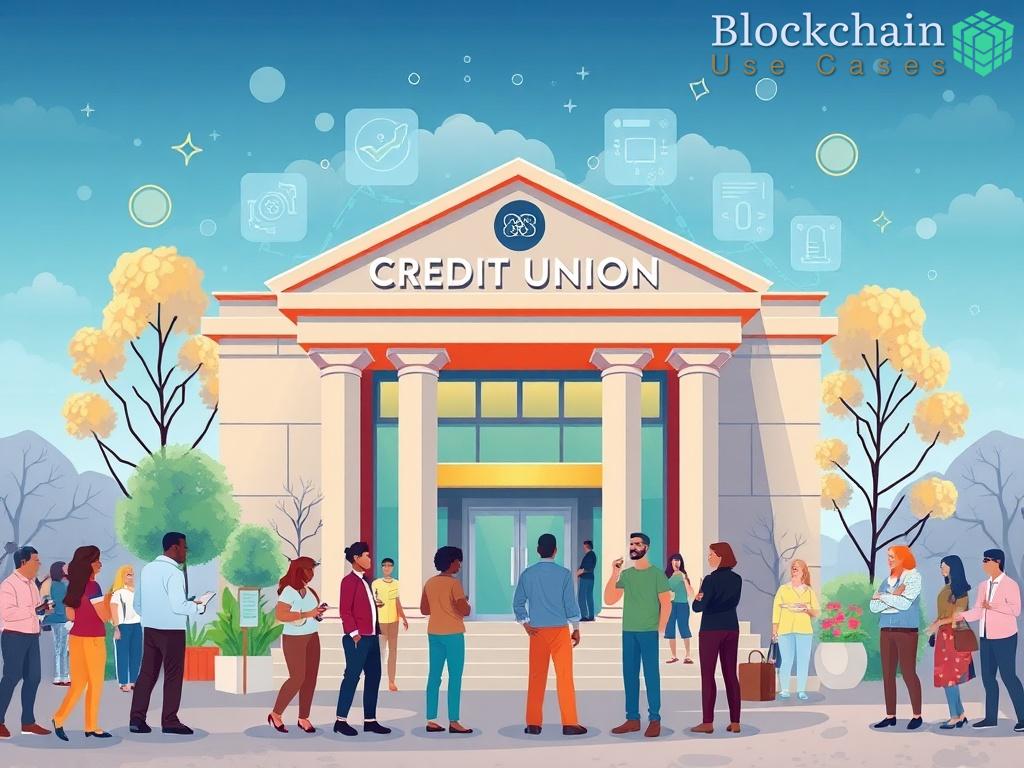The Fundamentals of Decentralized Credit Unions
In the evolving landscape of financial services, decentralized credit unions (DCUs) represent a transformative shift towards community-oriented banking. Unlike traditional credit unions, which rely on centralized authority and conventional banking protocols, DCUs leverage blockchain technology to enhance efficiency, transparency, and inclusivity. This innovative approach not only democratizes access to financial resources but also empowers members by placing control directly in their hands.
Decentralized credit unions are defined by several distinct characteristics that set them apart from their traditional counterparts. By harnessing the power of blockchain, these institutions can offer a variety of benefits to their members. Below is a list of the key features that distinguish DCUs:
- Member Empowerment: Members have a direct say in the governance and operations of the credit union, fostering a sense of ownership and community.
- Transparency: All transactions are recorded on the blockchain, allowing for real-time oversight and accountability.
- Lower Costs: Reduced operational overhead enables DCUs to offer lower fees and better interest rates compared to traditional banks.
- Global Accessibility: Blockchain technology allows members from diverse geographical locations to access services without limitations.
- Enhanced Security: Cryptographic protocols ensure that member data and transactions are safeguarded against breaches.
As the adoption of decentralized credit unions continues to grow, the future of community banking is poised for significant transformation. The ability to create financial products that are tailored to the needs of local communities, coupled with the potential for increased financial inclusion, positions DCUs as a viable alternative to traditional banking systems. Furthermore, as regulatory frameworks evolve to accommodate blockchain innovations, we can expect to see a surge in the establishment and acceptance of decentralized credit unions across the globe.
Blockchain Technology: Enhancing Transparency and Trust
The integration of blockchain technology into decentralized credit unions (DCUs) is not merely a trend; it is a pivotal advancement that fundamentally alters the dynamics of trust and transparency in financial transactions. By utilizing a distributed ledger, DCUs can ensure that every transaction is securely recorded and accessible for verification by all members, thereby fostering an environment of trust that is often lacking in traditional banking systems.
In a decentralized credit union, transparency is not just an ideal; it is a built-in feature of the blockchain framework. This system allows members to independently verify transactions in real-time, eliminating the opacity that can arise in conventional banking. The following aspects highlight the importance of transparency in DCUs:
- Immutable Records: Once a transaction is recorded on the blockchain, it cannot be altered or deleted. This immutability ensures that all financial activities are permanently documented, which is crucial for accountability.
- Decentralized Oversight: Unlike traditional institutions where oversight is centralized, DCUs distribute this responsibility among all members, allowing for collective monitoring and participation in governance.
- Accessible Information: Members can access a complete history of transactions at any time, promoting an open-book policy that builds trust among participants.
Trust is a cornerstone of any financial system, and in the realm of decentralized credit unions, blockchain technology enhances this trust through robust security measures. Cryptographic techniques ensure that member data and transactions are shielded from unauthorized access and fraud. Here’s how blockchain achieves this:
| Security Feature | Description |
|---|---|
| Data Encryption | All information is encrypted, ensuring that sensitive data remains confidential and secure from breaches. |
| Smart Contracts | Automated contracts execute transactions based on predefined conditions, reducing the risk of human error and enhancing reliability. |
| Consensus Mechanisms | Transactions require agreement from multiple network participants, which prevents fraudulent activities and ensures fairness. |
The combination of transparency and security provided by blockchain technology not only enhances the operational integrity of decentralized credit unions but also positions them as a trustworthy alternative in the financial landscape. As more individuals and communities recognize the benefits of this innovative approach, the future of community banking continues to look promising.
Community Engagement in Decentralized Banking Models

As decentralized credit unions (DCUs) continue to reshape the financial landscape, community engagement emerges as a cornerstone of their operational model. Unlike traditional banking systems that often alienate their clientele, DCUs prioritize member involvement and feedback, creating a collaborative environment where financial decisions are made with the community’s best interests at heart. This participatory dynamic not only enhances member satisfaction but also fosters a sense of belonging and shared purpose among participants.
In decentralized banking, empowerment transcends mere membership; it entails giving individuals a voice in the governance and decision-making processes of the credit union. By utilizing blockchain technology, DCUs can implement democratic voting mechanisms, enabling each member to influence key decisions such as interest rates, community lending initiatives, and the allocation of funds. This collaborative approach encourages members to take ownership of their financial futures while promoting transparency and accountability.
The essence of community banking lies in trust, and decentralized credit unions are uniquely positioned to cultivate this trust through collaborative efforts. By facilitating regular interactions among members, such as community forums and educational workshops, DCUs can strengthen relationships and enhance collective financial literacy. These engagements not only inform members about financial products and services but also allow them to share experiences and insights, further solidifying the community bond.
To illustrate the multifaceted nature of community engagement in decentralized banking models, consider the following key initiatives that can foster a more vibrant and interactive member experience:
- Local Investment Programs: Encouraging members to invest in local businesses or initiatives can stimulate economic growth and enhance community ties.
- Feedback Mechanisms: Implementing platforms for members to voice their opinions on services and governance can lead to more responsive and adaptive decision-making.
- Financial Education Workshops: Offering educational resources and training can empower members to make informed financial choices, fostering a culture of financial literacy.
As decentralized credit unions evolve, their commitment to community engagement will be pivotal in establishing sustainable ecosystems that benefit members and their surrounding environments. By prioritizing inclusivity and collaboration, DCUs can ensure that financial services are not only accessible but also tailored to meet the unique needs of diverse communities. The shift towards a more engaged and responsive banking model heralds a new era in community finance, one where members actively shape their financial destinies.
Regulatory Challenges and Solutions for Decentralized Credit Unions
The emergence of decentralized credit unions (DCUs) has ushered in a new paradigm of community banking that is both innovative and disruptive. However, with the promise of enhanced transparency and member empowerment comes the challenge of navigating a complex regulatory landscape. As DCUs strive to operate within legal frameworks that have not yet fully adapted to their unique characteristics, understanding these regulatory challenges and identifying potential solutions is crucial for their successful integration into the financial ecosystem.
The regulatory framework surrounding financial institutions has traditionally been designed for centralized entities, leaving decentralized models like DCUs in a gray area. The primary challenges include compliance with anti-money laundering (AML) regulations, data protection laws, and the need for consumer protection mechanisms. Each of these challenges presents a potential roadblock to the growth and legitimacy of DCUs.
To overcome these challenges, decentralized credit unions must proactively engage with regulators and develop innovative compliance strategies. Below is a list of potential solutions that can help DCUs align with existing regulations while preserving their decentralized ethos:
- Collaborative Regulatory Approach: Establish partnerships with regulatory bodies to co-create guidelines that accommodate the unique aspects of DCUs, fostering a more supportive regulatory environment.
- Enhanced Transparency Protocols: Implement advanced tracking and reporting systems on the blockchain to facilitate compliance with AML and Know Your Customer (KYC) regulations, ensuring that all transactions are traceable and accountable.
- Consumer Education Initiatives: Develop programs aimed at informing members about their rights and responsibilities within the decentralized framework, thus empowering them to make informed decisions while fostering a culture of compliance.
By adopting these strategies, decentralized credit unions can not only navigate regulatory challenges but also emerge as pioneers in creating a more inclusive and resilient financial framework. As the dialogue between regulators and DCUs evolves, both parties stand to benefit from a collaborative approach that embraces innovation while safeguarding the interests of members and the broader community.
The Future of Community Banking: Trends and Innovations
The landscape of community banking is undergoing a radical transformation driven by technological advancements and consumer expectations. Decentralized credit unions (DCUs) are at the forefront of this evolution, harnessing the potential of blockchain technology to reshape how financial services are delivered. As we delve into the future of community banking, it is essential to explore emerging trends and innovations that are poised to enhance member experience and drive financial inclusivity.
One of the most significant trends in the future of community banking is the push towards greater financial inclusion. DCUs leverage blockchain’s capabilities to provide access to individuals who have historically been excluded from traditional financial systems. Innovative solutions such as mobile banking applications and peer-to-peer lending platforms enable members to engage with their financial institutions seamlessly, regardless of their geographical location.
The demand for personalized financial services is on the rise as consumers seek products that cater to their unique needs and preferences. In this context, decentralized credit unions are utilizing data analytics and artificial intelligence to tailor services and offerings. By analyzing member behavior and preferences, DCUs can design customized financial solutions that resonate with individual members.
As the landscape continues to evolve, several groundbreaking innovations are set to redefine the future of community banking. Below is a list of key innovations that are emerging in the realm of decentralized credit unions:
- Smart Contracts: Automating processes and agreements through blockchain technology enhances efficiency and reduces the potential for human error.
- Decentralized Finance (DeFi) Integration: Collaborating with DeFi platforms offers DCUs new avenues for investment and lending opportunities, providing members with access to a broader range of financial services.
- Community-Centric Governance: Utilizing blockchain to enable democratic governance structures allows members to have a direct impact on decision-making processes.
Each of these innovations not only enhances the operational capabilities of decentralized credit unions but also aligns with the core mission of fostering community engagement and trust.





